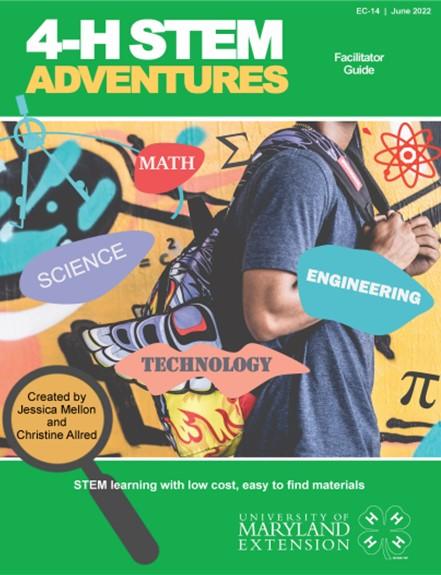
EC-14 | June 2022
4-H STEM Adventures-Facilitator Guide
4-H STEM Adventures is a curriculum of six STEM (science, technology, engineering, and math) lesson plans that teach STEM principles and 4-H life skills via a challenge to be solved using low-cost, easy-to-find materials. There are two tracks for each lesson: an open-ended exploratory option, and a step-by-step guided option. Videos introduce each challenge and provide sample solutions for viewers. These lessons are appropriate for youth ages 8-13 and can be used in the classroom, 4-H club, home, and out-of-school settings.

TABLE OF CONTENTS
FRAMEWORK
This facilitator guide is intended for 4-H professionals, classroom teachers, after-school or summer camp educators, 4-H club leaders, and home school parents. Two different approaches are offered. The “Guided” approach is intended for younger children (ages 8 to 10). This approach provides step-by-step instruction and handouts that utilize the engineering design process.
The “Exploratory” approach is intended for older children (ages 11 to 13) or for situations where the youth has unlimited time to explore. The Exploratory track challenges are open-ended and allow youth to develop their own solutions.
During the COVID-19 pandemic, 4-H programming had to adapt quickly to a virtual environment. As 4-H educators, we recognized a need for youth to continue to develop their STEM skills and interests. We created these hands-on challenges and videos to meet that need. Youth can solve these challenges in multiple ways using items found at home. All materials listed are suggestions. Youth are encouraged to think flexibly when it comes to sourcing the items needed to complete the challenges.
In 4-H, members “learn by doing.” The three-step model of "DO, REFLECT, APPLY" encourages members to “Do” an activity, “Reflect” on what worked and what didn’t, and then “Apply” what they have learned to their everyday lives. Look for the directives “Do,” “Reflect,” and “Apply” in the following challenges.
INTRODUCTION AND SUCCESS INDICATORS
TARGET AUDIENCE
Youth ages 8 to 13
TIME FRAME
45 - 60 minutes per challenge
LEARNING OBJECTIVES
Youth will gain knowledge of science, technology, engineering, and mathematics (STEM) vocabulary and concepts while developing their life skills.
FACILITATOR GUIDE ICONS
|
|
MATERIALS A list of suggested materials to be used. |
|
STEM VOCABULARY Important vocabulary words integral to the STEM challenge are in GREEN. |
|
|
4-H LIFE SKILLS These practical life skills encourage life long learning, problem solving and other skills critical to success |
SUCCESS INDICATORS
Youth will successfully:
- Build a marble maze that moves a marble from start to finish
- Build a paper tower as tall as they are
- Build a catapult that launches projectiles
- Build a marble roller coaster that moves a marble from top to bottom
- Build a mini golf course that includes obstacles
- Build a mobile that balances
EXPLORATORY VS. GUIDED APPROACHES EXPLAINED
Adult facilitators have the option of choosing either exploratory or guided approaches to each challenge. Both approaches have pros and cons. Choose the approach that best suits the youth with whom you are working.
GUIDED APPROACH
Provides structure, promotes good instruction-following habits, increases rate of success, and limits creative solutions. Generally best for classroom settings, finite blocks of time, and youth ages 8 to 10.
EXPLORATORY APPROACH
Encourages creativity and deductive reasoning, lacks structure, takes more time, and risks frustration for the youth. Generally best for out-of-school-time settings, large blocks of time, and youth ages 11 to 13.

| JESSICA MELLON jmellon2@umd.edu CHRISTINE ALLRED cmallred@umd.edu This publication, 4-H STEM Adventures-Facilitator Guide (EC-14) is a part of a collection produced by the University of Maryland Extension within the College of Agriculture and Natural Resources. The information presented has met UME peer-review standards, including internal and external technical review. For help accessing this or any UME publication contact: itaccessibility@umd.edu For more information on this and other topics, visit the University of Maryland Extension website at extension.umd.edu University programs, activities, and facilities are available to all without regard to race, color, sex, gender identity or expression, sexual orientation, marital status, age, national origin, political affiliation, physical or mental disability, religion, protected veteran status, genetic information, personal appearance, or any other legally protected class. |